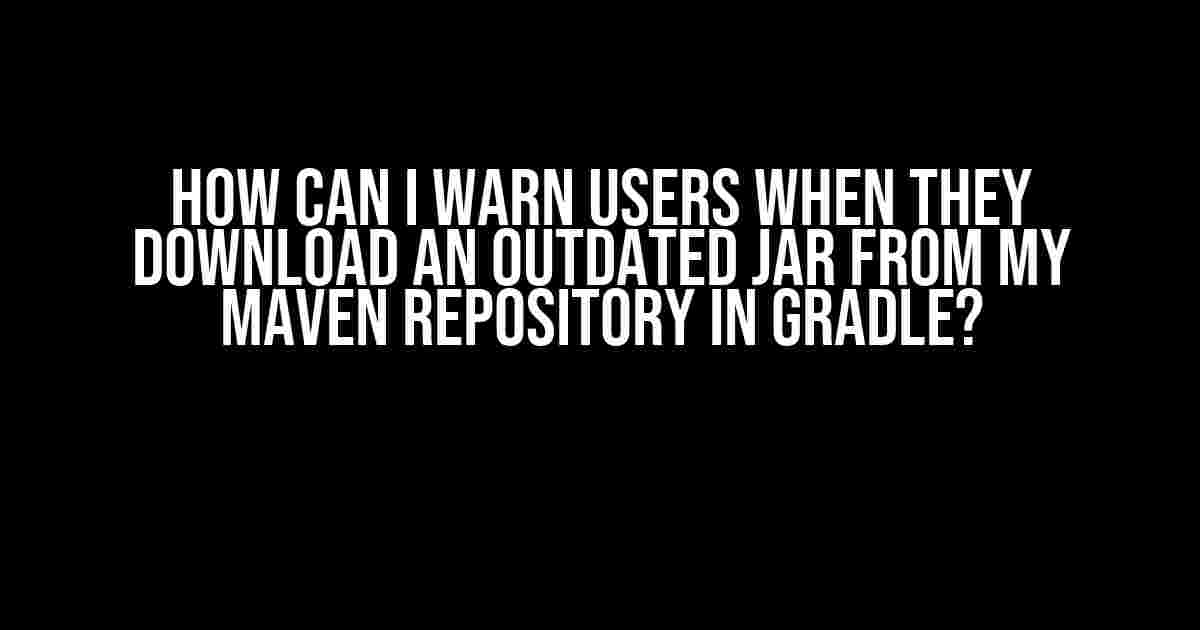Are you tired of users complaining about outdated JAR files in your Maven repository? Do you want to ensure that your users are always using the latest and greatest version of your library? Look no further! In this article, we’ll show you how to warn users when they download an outdated JAR from your Maven repository in Gradle.
Why Is This Important?
Using outdated JAR files can lead to a range of issues, from compatibility problems to security vulnerabilities. By warning users when they download an outdated JAR, you can help them avoid these issues and ensure that they’re getting the best possible experience from your library. Plus, it’s just good practice to keep your users informed!
What You’ll Need
- Gradle 5.0 or later
- A Maven repository (such as Maven Central or a private repository)
- A JAR file to publish to your Maven repository
Step 1: Add the Maven Publish Plugin
The first step is to add the Maven Publish plugin to your Gradle build file. This plugin allows you to publish your JAR file to a Maven repository. Add the following code to your `build.gradle` file:
plugins {
id 'maven-publish'
}
Step 2: Configure the Maven Publish Plugin
Next, you’ll need to configure the Maven Publish plugin to point to your Maven repository. Add the following code to your `build.gradle` file:
publishing {
publications {
myPublication(MavenPublication) {
groupId = 'com.example'
artifactId = 'my-library'
version = '1.0.0'
}
}
repositories {
maven {
url 'https://my.maven.repository.com'
credentials {
username = 'my-username'
password = 'my-password'
}
}
}
}
Make sure to replace the placeholders with your own values!
Step 3: Add a Version Checker
Now, let’s add a version checker to our build file. This will allow us to check the version of the JAR file being downloaded and warn users if it’s outdated. Add the following code to your `build.gradle` file:
task checkVersion {
doLast {
def version = project.version
def latestVersion = '1.0.0' // replace with the latest version of your library
if (version != latestVersion) {
println "Warning: You are using an outdated version of the library (${version}). The latest version is ${latestVersion}."
}
}
}
Make sure to replace the `latestVersion` placeholder with the actual latest version of your library!
Step 4: Configure the Distribution Management
Next, you’ll need to configure the distribution management to include the version checker in the Maven repository. Add the following code to your `build.gradle` file:
publishing {
publications {
myPublication(MavenPublication) {
...
}
}
repositories {
maven {
...
}
}
distributions {
myDistribution {
contents {
from components.java
}
versionMapping {
usage('java-api') {
from_resolve {
dependencies {
dependency 'com.example:my-library:1.0.0'
}
}
}
}
pom {
withXml {
def pom = asElement()
pom.versionewan warnings = new StringBuilder()
warnings.append("Warning: You are using an outdated version of the library. The latest version is ${latestVersion}.")
pom.versionewan warnings = warnings.toString()
}
}
}
}
}
This code will include the version checker in the Maven repository and add a warning to the POM file if the user downloads an outdated JAR.
Step 5: Publish to the Maven Repository
Finally, you’ll need to publish your JAR file to the Maven repository. Run the following command in your terminal:
gradle publish
This will upload your JAR file to the Maven repository, including the version checker and warning message.
Testing the Warning
Let’s test the warning by downloading an outdated JAR file from the Maven repository. Run the following command in your terminal:
mvn dependency:get -DgroupId=com.example -DartifactId=my-library -Dversion=0.9.9
This should download the JAR file and display the warning message:
Warning: You are using an outdated version of the library (0.9.9). The latest version is 1.0.0.Congratulations! You've successfully warned users when they download an outdated JAR from your Maven repository in Gradle.
Troubleshooting
If you're having trouble getting the warning to display, make sure that:
- The `checkVersion` task is running successfully
- The `distributions` block is configured correctly
- The POM file is being generated correctly
If you're still having trouble, try checking the Gradle logs for errors or adding more debug output to the `checkVersion` task.
Conclusion
In this article, we've shown you how to warn users when they download an outdated JAR from your Maven repository in Gradle. By following these steps, you can help ensure that your users are always using the latest and greatest version of your library.
Remember to keep your Maven repository up to date and to regularly check for outdated JAR files. Happy building!
| Step | Description |
|---|---|
| 1 | Add the Maven Publish plugin |
| 2 | Configure the Maven Publish plugin |
| 3 | Add a version checker |
| 4 | Configure the distribution management |
| 5 | Publish to the Maven repository |
By following these steps, you can ensure that your users are always using the latest version of your library.
Frequently Asked Question
Are you tired of users downloading outdated JARs from your Maven repository in Gradle? Worry no more! We've got you covered with these FAQs to help you warn users and keep them updated.
How can I detect when a user is downloading an outdated JAR?
You can use the `maven-publish` plugin in Gradle to specify a `version` property in your `pom.xml` file. This will allow you to track the version of your JAR and notify users when they're downloading an outdated one.
Can I display a warning message when a user downloads an outdated JAR?
Yes, you can! Use the ` Gradle Metadata` feature to attach a warning message to your JAR. This way, when a user tries to download an outdated version, they'll see a clear warning message indicating that they should update to a newer version.
How can I redirect users to the latest version of my JAR?
You can use the `Maven Repository` feature to redirect users to the latest version of your JAR. By specifying the `latestVersion` property in your `pom.xml` file, you can ensure that users are always directed to the most up-to-date version.
Can I use a custom warning message for outdated JARs?
Absolutely! You can customize the warning message by adding a `description` property to your `pom.xml` file. This way, you can tailor the message to fit your project's specific needs and branding.
Are there any third-party tools that can help me with warning users about outdated JARs?
Yes, there are several third-party tools and plugins available that can help you warn users about outdated JARs. For example, you can use the `Gradle Nexus Plugin` or the `Maven Repository Manager` to automate the process and make it easier to manage your project's dependencies.


